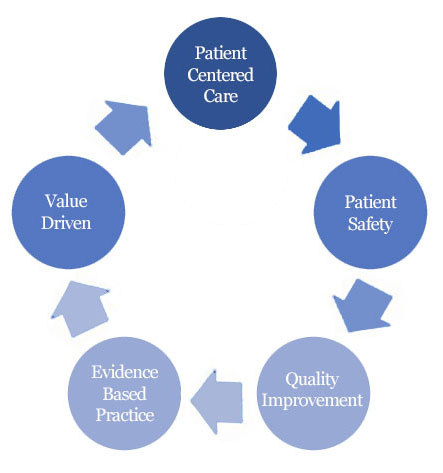Patient Safety/Quality Improvement (PSQI)
 The University of Tennessee Graduate Medical Education Program is committed to the
education and development of exemplary physicians who practice patient-centered health
care, foster innovation in patient safety, and create strong inter-professional teams
to promote quality, safety, and value in health care across the continuum.
The University of Tennessee Graduate Medical Education Program is committed to the
education and development of exemplary physicians who practice patient-centered health
care, foster innovation in patient safety, and create strong inter-professional teams
to promote quality, safety, and value in health care across the continuum.
In the Institute of Medicine publication Crossing the Quality Chasm six specific aims were identified in order for the health care system to deliver quality care. In this short video Dr. Don Berwick will explain the Triple Aim for Healthcare, including population health, cost, and the “STEEEP” principles (which include care that is safe, timely, effective, efficient,, equitable, and patient centered).
An Overview of the IHI Triple Aim
| Site | Hospital/Clinic Phone Number | Security Escort Number |
| Ascension Midtown Nashville | 615.284.5475 | 615.284.5555 |
| Ascension Rutherford Nashville | 615.396.4288 | 615.396.4100 |
| Ascension West Nashville | 615.222.2171 | 615.222.2111 |
| Baptist Memorial Hospital | 901.226.5520 | 901.226.5520 |
| Baptist Memorial Hospital for Women | 901.227.9000 | 901.227.9797 |
| Baptist Collierville | 901.861.9000 | 901.861.8818 |
| Campbell Clinic | 901.759.3100 | |
| Le Bonheur Children's Hospital | 901.287.6017 | 901.287.4456 |
| Methodist Le Bonheur Germantown Hospital | 901.516.9000 | 901.516.6660 |
| Methodist South Hospital | 901.516.3700 | 901.581.0770 |
| Methodist University Hospital | 901.516.7765 | 901.516.7765 |
| Regional One Health | 901.545.7700 or extension 711 | 901.545.7700 or extension 711 |
| Saint Francis Hospital | 901.765.1000 | 901.765.2900 |
| Semmes Murphey | 901.522.7700 | |
| St. Jude Children's Research Hospital | 901.595.4444 or extension 4444 | 901.595.4444 or extension 4444 |
| VA Medical Center | 901.577.7570 or extensions 5595 or 5611 | 901.577.7570 or extensions 5595 or 5611 |
| West TN Healthcare Jackson | 731.541.6006 | 731.541.5000 |
If you are interested in information about or joining any committee at Regional One Health, please contact Kayla Ingram at kingram2@regionalonehealth.org (901.545.7960) and Kayla will connect you with the Committee Chairperson.
| Committee | Meeting Frequency | Meeting Location |
| Antimicrobial Stewardship | 1x Month | Microsoft Teams |
| Code Blue Committee | 1x Quarter | Microsoft Teams |
| Falls Committee | 1x Month | Microsoft Teams |
| Harm Events Collaborative | 1x Month | Microsoft Teams |
| Hospital Acquired Pressure Injury (HAPI) Prevention | 1x Month | Microsoft Teams |
| Infection Prevention | 1x Month | Microsoft Teams |
| M&M Burn Committee | 1x Month | In-person |
| Opioid Stewardship | 2x Month | Microsoft Teams |
| Organ and Tissue Donation Committee | 1x Quarter | Microsoft Teams |
| Policy Committee | 1x Month | Microsoft Teams |
| Quality Practice Patient Safety Committee | 1x Month | Microsoft Teams |
| Sepsis Committee | 1x Month | Microsoft Teams |
- American College of Physicians on Patient Safety
- American College of Surgeons on Patient Safety
- Agency for Healthcare Research and Quality (AHRQ)
- AHA on Quality and Patient Safety
- American Medical Association (AMA)
- AMA Patient Safety: An Overview
- Armstrong Institute for Patient Safety and Quality
- AAMC Association of American Medical Colleges Faculty Development Resources
- Association of Perioperative Registered Nurses
- Center for Disease Control
- Choosing Wisely
- Failure Modes and Effects Analysis (FMEA)
- FMEA Worksheet
- Free from Harm
- Healthcare Matrix
- Institute for Safe Medical Practices
- The Joint Commission on Patient Safety
- National Patient Safety Foundation
- Preventing a Failure Before Any Harm is Done
- Prevention of Perioperative Pressure Ulcers Toolkit
- Root Cause Analysis
- Universal Protocol (Timeout for Procedures)
- Using a Healthcare Matrix (Bingham)
- VA National Center for Patient Safety
- World Health Organization on Patient Safety
- WHO Surgical Safety Checklist
